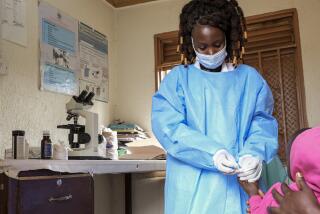Long in Denial, Nigeria Faces Up to AIDS : Africa: People now are openly talking about the epidemic. Frightening statistics are coming to light on its scourge in the continent’s most populated nation.
- Share via
LAGOS, Nigeria — Many years after the United States and Europe woke up to the deadly spread of AIDS, Nigerians denied the disease was also killing them.
Today, people are openly talking about AIDS, and frightening statistics are coming to light on the scourge in Africa’s most populated nation.
“The Nigerian epidemic was not identified until 1986,” said Dr. Abiola Tilley-Gyado, national coordinator of the AIDS control campaign in the West African country.
“From 1986, we have in terms of full-blown AIDS about 971 reported cases from all over the country.”
Experts say that is far from the real situation in a country of 88.5 million where most diseases are underreported.
Underreporting is greater in the case of AIDS, because of its relative novelty and the stigma attached to it.
Tilley-Gyado’s unit has carried out several kinds of surveys across the country and the conclusions are worrying.
“If the results are computed among the sexually active group, that is those aged 15 and above, we come to the conclusion that there must be at least 650,000 HIV-infected people in the country,” Tilley-Gyado said.
HIV is the virus that causes AIDS, which destroys the body’s immune system and leaves an infected person defenseless against other diseases.
It has no cure.
Some native medicine men claim they can cure it with herbal concoctions. “We have asked such people to come forward and to treat a person actually tested and found to have AIDS, but so far they haven’t,” Tilley-Gyado said.
In a country where one man can have several wives and as many mistresses, casual sex has been identified as the main means by which AIDS is spreading.
One survey of prostitutes showed 18% of those tested in some of Nigeria’s 30 states were HIV positive.
“In some states, if you have two commercial sex workers standing side by side, one will be HIV positive,” said Tilley-Gyado.
After grudgingly acknowledging AIDS was not just a foreign disease, Nigeria launched a massive campaign in 1991 to control its spread.
Each state now has a coordinator and all the 589 local government areas have units dealing with AIDS and sexually transmitted diseases.
Because of the campaign, many people are now inclined to attribute the death of someone who suddenly begins to lose weight to AIDS rather than to evil spirits.
Recently a young university lecturer died in northern Nigeria and the hospital would not disclose the cause of death.
His friends immediately concluded it was AIDS.
“The guy had many girlfriends and just started wasting away,” one said. “Everyone suspected he had AIDS.”
Television and radio are frequently carrying jingles warning against behavior that can lead to contracting the disease. “AIDS kills; avoid unprotected pleasures,” one jingle says.
But Tilley-Gyado insists her campaign aims to promote change in people’s sexual attitudes rather than condoms.
“We are promoting chastity before marriage (and) intra-marital fidelity, which are age-old values of our society,” she said.
But she acknowledged that sales of condoms are booming in Nigeria and said this means Nigerians may be unable to change their sexual attitudes but want to protect themselves.
Foreign governments are helping fight the epidemic.
Britain has helped establish two screening centers in every state, and the United States has earmarked $15 million for an AIDS program in Nigeria.
More to Read
Sign up for Essential California
The most important California stories and recommendations in your inbox every morning.
You may occasionally receive promotional content from the Los Angeles Times.













